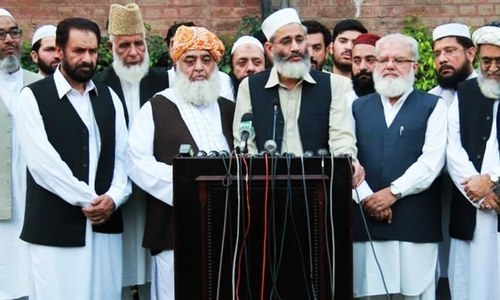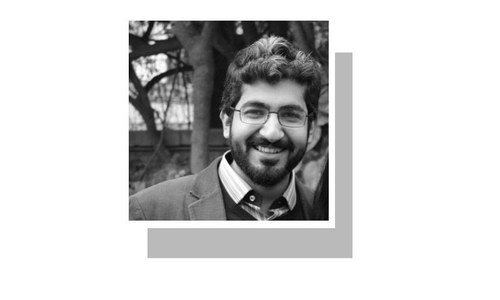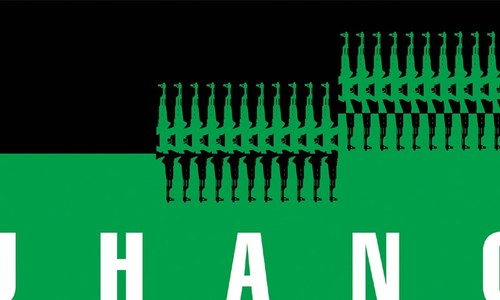Jhang is no stranger to people using popular channels to express sentiments tinged with religion, dotted as the district is with Sufi shrines. There are over 50 spiritual seats in the district alone. Hazrat Sultan Bahu, Shah Jewana, Sial Sharif, Mai Heer, Athara Hazari and Hazrat Shah Sheikhan are all venerable saints having large followings.
The faithful say the shrines have been providing them with relief in moments of need. They are where they seek health when they are ill, money when they are broke and peace against restlessness. This is how it has been for centuries. In return the followers have helped guardians of the mausoleums (sajjada nasheen) establish their social and political clout in their areas over time.
This influence of the spiritual leaders on people was said to be a huge reason why the Jamiat Ulema-i-Pakistan (JUP) candidates famously won all three National Assembly seats in Jhang in the 1970 general elections. This created quite a stir because it was a huge and unprecedented success for the Sunni-Barelvi vote in any district. In that election the JUP secured two seats in Karachi, the party’s base.
You need around 5,000 workers for fairly competing in one National Assembly constituency and only major parties can have these numbers over hundreds of seats — parties which have been in power and thus have accumulated the required financial resources. Qari Zawwar Bahadur
The winners in Jhang I, II and III (NA-46, -47, and -48 then) were Ghulam Haider Bharwana, the maternal grandfather of former PML-N MNA Ghulam Bibi Bharwana; Maulana Zikarullah, the father of ex-PML-N MPA Maulana Rehmatullah; and Sahibzada Nazeer Sultan, a descendent of Hazrat Sultan Bahu who later joined the Pakistan Peoples Party, respectively.
According to reports, it was the first time that the sectarian card was used in Jhang politics, which featured Arif Sial and retired Col Syed Abid Hussain. The district earned notoriety for sectarian violence in the decades to come.
The Sunni-Barelvi influence did seep considerably into the neighbouring Mianwali district, but JUP nominee Maulana Abdul Sattar Niazi lost to Nawab of Kalabagh Nawabzada Muzaffar Ali Khan by a margin of 5,000 votes in the 1970 elections. To this day Qari Zawwar Bahadur, a leader of a splinter group of the JUP, alleges that the election results were manipulated by the powerful Nawabs in their favour. Otherwise Maulana Niazi was tough to beat, being one of the strongest candidates of the party in that era.
Another seat the JUP could secure was from Hyderabad, where Maulana Syed Ali Rizvi won against Jamaat-i-Islami’s Maulana Wasi Mazhar Nadvi.
The party did win occasionally in the subsequent elections (but as part of alliances). It could never repeat the 1970 performance. The Barelvi vote was divided as the ‘electables’ associated with the JUP deserted it and the party fragmented into small groups.
The faction headed by Haji Hanif Tayyab parted ways with Maulana Shah Ahmed Noorani-led main group after Maulana Noorani decided to stay away from the Majlis-i-Shoora of Gen Ziaul Haq, making a big split in the party ranks. The JUP-Noorani boycotted the 1985 non-party polls, while Maulana Noorani’s inclusion in the anti-PPP alliances of the late 1980s and early 1990s helped conceal whatever potential the Barelvi vote had at the time.

Interestingly enough, the Barelvi influence in Jhang was also neutralised by the Deobandi school of thought, the process accelerating after the murder of Maulana Haq Nawaz Jhangvi in 1990. “The late Jhangvi belonged to the Barelvi school of thought,” said Qari Zawwar. Later on, Deobandi activists not only took over the Sipah-i-Sahaba Pakistan (SSP), founded by Maulana Jhangvi, but they also seized control of the constituency from where Maulana Azam Tariq had won in 2002.
Zawwar blamed Gen Zia’s policies for diverting the religious youth towards extremism, badly hurting political basis of religio-political outfits. “In Karachi, new outfits were groomed on the ‘ruins’ of the JUP, while in Jhang and adjacent areas sectarianism damaged the influence of the party, which lacked financial resources to keep its organisational structure intact and its leaders went to major political parties like the PPP and PML-N.”
Makhdoom Arshad, a former leader of the PML-N’s Ulema-o-Mashaikh Wing and a JUP-Noorani nominee for NA-100 (Chiniot) from the platform of five-member religious alliance MMA, said there had never been a JUP vote bank. “These were seats where the spiritual leaders wielded great influence. The local right wing lent its support to certain electables; otherwise the JUP had no physical presence in the area,” he told Dawn by telephone, taking a break from electioneering in Chiniot town.
Zawwar, as an old JUP man, is not upbeat about the electoral future of Tehreek Labbaik Pakistan (TLP), which is sometimes hailed as a successor to the JUP as it stood in Jhang in 1970. He believes the TLP will damage its stakes due to the way its inexperienced leadership is issuing tickets to each and every seeker without analysing their character and worth.
Referring to the ‘impressive’ tally of votes secured by the TLP in the recent four by-polls, Zawwar argues that contesting one or two seats was different from going into general elections. “You need around 5,000 workers for fairly competing in one National Assembly constituency and only major parties can have these numbers over hundreds of seats — parties which have been in power and thus have accumulated the required financial resources. The TLP lacks these means,” says the Lahore-based JUP leader.
However, he sees some chances of the TLP securing at least one seat in Karachi as, according to him, the financially-sound Memon community is supporting the group there.
Published in Dawn, July 3rd, 2018














































